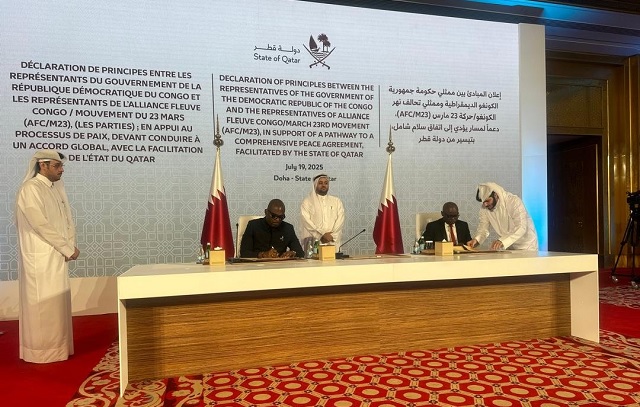
This is not a peace you declare on Monday and implement on Tuesday. It is a peace that must be built
KINSHASA, DRC | Xinhua | The peace process in the Democratic Republic of the Congo (DRC) has entered its “most delicate phase,” the DRC government has said.
“There is no war that doesn’t come to an end. Today, we are in the most delicate phase (…) which is leading us toward a soft landing — toward peace,” government spokesperson Patrick Muyaya told a press conference Monday evening with Deputy Prime Minister and Minister of Interior and Security Jacquemain Shabani.
The press event followed the signing in Doha, Qatar, last Saturday of a declaration of principles between the DRC government and the March 23 Movement (M23) rebel group.
Muyaya said the agreement, which was reached after rounds of talks mediated by Qatar, represents a decisive step toward a comprehensive resolution of the conflict in the eastern DRC.
“Peace is a choice, and the president of the republic (Felix Tshisekedi) has clearly made that choice,” he said. “But peace comes at a cost, and that is the cost we are paying through these various discussions.”
The declaration of principles provides for the launch of direct negotiations between Kinshasa and the M23 in the first week of August, with the goal of concluding and signing a peace agreement within 10 days of the talks’ commencement — no later than Aug. 18.
Shabani, who participated in the Doha talks as an “observer,” noted that the declaration of principles would serve as the foundation for a future binding agreement. The document outlines seven key pillars, including a permanent ceasefire, the return of refugees, demobilization, and the restoration of state authority in affected areas.
“All stakeholders are reassuring each other of their commitment to pursuing the peace process,” he said. “This is not a peace you declare on Monday and implement on Tuesday. It is a peace that must be built.”
According to the United Nations, more than 27.8 million people in the DRC are facing food insecurity, with over 7 million internally displaced, many of them multiple times. ■
 The Independent Uganda: You get the Truth we Pay the Price
The Independent Uganda: You get the Truth we Pay the Price





